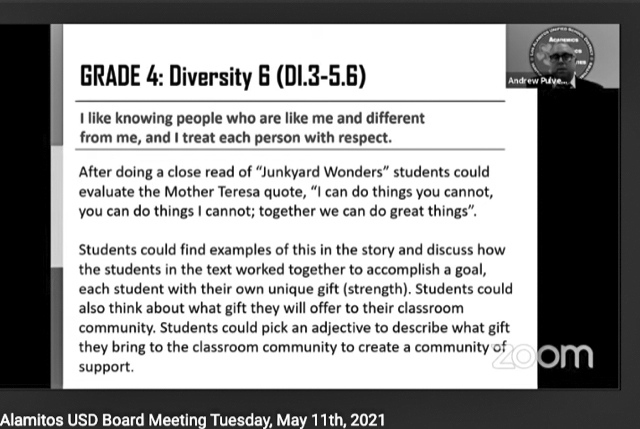The Los Alamitos Unified Board of Education is due to vote next week on coursework for an already approved ethnic studies elective at Los Alamitos High School. But the district is “still assessing” whether that meeting will be held in-person or virtually, according to Superintendent Dr. Andrew Pulver.
Meanwhile, Pulver said full implementation of social justice standards adopted at the Board’s last meeting could take years.
The standards, billed as a supplemental framework for K-12 teachers to make schools “more inclusive, equitable, and safe for all students by reducing acts of bullying, prejudice, and minimizing conflict,” were approved in a unanimous vote during the May 11 virtual meeting that lasted six hours.
Safety concerns prompted LAUSD to move that Board meeting online after law enforcement reported “social media chatter” suggesting a potential for violence. In a phone interview on Friday, Pulver said the goal is to hold the June 1 meeting in-person but cautioned no decision had been made yet.
“We’ll have to wait and see,” Pulver said noting he’s been in touch with local law enforcement. He said people have contacted the district with concerns about the safety of student speakers.
The optional ethnic studies course at Los Alamitos High School and the social justice standards have sparked passionate and sometimes heated debate from supporters and opponents at Board meetings over the past few months.
The district has also drawn scrutiny and criticism from conservative activists supporting a school choice ballot measure.
Students, parents and some Board members in their public comments have said ethnic studies and the social justice standards are necessary to meet the needs of LAUSD’s increasingly diverse student body who want to see themselves in their lessons and want new resources to better address intolerance on campuses.
Other parents and members of the LAUSD community question how programs will be implemented with some expressing fears it could lead to indoctrination of children using critical race theory, which they say creates divisions.
The district has repeatedly said its efforts are not related to critical race theory which examines how laws and policies in the United States have impacted opportunities for people of color. LAUSD said its focus is on “culturally responsive instruction” that was developed to be more inclusive and reflective of students.
The efforts started in 2018 after speakers flooded a Board meeting with stories of racism in the district. That came shortly after an LAUSD principal’s controversial Facebook post criticizing former NFL quarterback Colin Kaepernick.
A Human Relations Task Force (now called the Human Relations Advisory Council) was formed, a consultant was hired and, more recently, a Teacher on Special Assignment (T.O.S.A) on Diversity, Equity and Inclusion was appointed.
“Slow Rollout” Expected for Social Justice Standards
Now nearly three years later, an ethnic studies elective is due to be offered in the Fall of 2021, but according to Pulver, it will take years before the social justice standards, which are not mandated, are fully implemented with staff.
“This is not a one and done,” Pulver said. He described a “slow rollout” of the standards for staff, and likened it to the five to seven years it took to fully implement Cognitively Guided Instruction, an elementary-level mathematics professional development program.
Pulver stressed the focus right now is getting students back in class full-time again for the 2021-22 school year, with added social and emotional health support. He said that will happen for the upcoming school year which starts in August.
The social justice standards were first introduced at public a workshop in March and come from learningforjustice.org, formerly tolerance.org, a project of the Southern Poverty Law Center.
During that presentation in March, Deputy Supt. Ondrea Reed explained the potential next steps after approval would include the T.O.S.A. possibly holding trainings at school site staff meetings during the end of this academic year, the offering of Culturally Responsive Instruction programs during teachers’ upcoming summer trainings and adding it to the many offerings in the district’s 5-year professional development plan.
Pulver said that he is not aware of any funding that could be used to implement the standards and said funding was never a motivation in their development.
At the May 11 Board meeting, Board members emphasized their faith in teachers and the importance of how the standards would be presented to staff.
Board member Diana Hill had a message for parents that they are part of a partnership as this effort unfolds.
“We have extraordinary staff and I believe that our staff will be trained properly and I believe that things will be put out as they start to roll out into schools and stuff. But if there are things that don’t sit right with parents, we want to know what those are. And a lot of the times I believe that they are misunderstandings. … We have to be able to continue to communicate about those things.”

